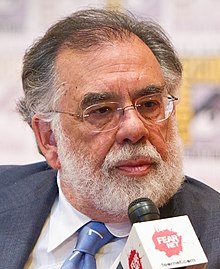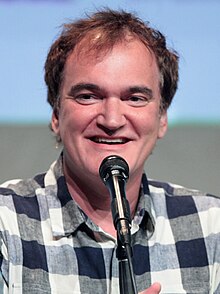TIM BURTON
 "Tim" Burton (born August 25, 1958) is an American film director, producer, artist, writer and animator. He is known for his dark, gothic and quirky fantasy films such as Beetlejuice (1988), Edward Scissorhands (1990), the animated musical The Nightmare Before Christmas (1993), the biographical film Ed Wood (1994), the horror fantasy Sleepy Hollow (1999), and later efforts such as Corpse Bride (2005), Sweeney Todd: The Demon Barber of Fleet Street (2007), Dark Shadows (2012) and Frankenweenie (2012). He is also known for blockbusters such as the adventure comedy Pee-wee's Big Adventure (1985), the superhero films Batman (1989) and its first sequel Batman Returns (1992), the sci-fi film Planet of the Apes (2001), the musical adventure film Charlie and the Chocolate Factory (2005) and the fantasy film Alice in Wonderland (2010), which garnered a worldwide gross of over $1 billion.
"Tim" Burton (born August 25, 1958) is an American film director, producer, artist, writer and animator. He is known for his dark, gothic and quirky fantasy films such as Beetlejuice (1988), Edward Scissorhands (1990), the animated musical The Nightmare Before Christmas (1993), the biographical film Ed Wood (1994), the horror fantasy Sleepy Hollow (1999), and later efforts such as Corpse Bride (2005), Sweeney Todd: The Demon Barber of Fleet Street (2007), Dark Shadows (2012) and Frankenweenie (2012). He is also known for blockbusters such as the adventure comedy Pee-wee's Big Adventure (1985), the superhero films Batman (1989) and its first sequel Batman Returns (1992), the sci-fi film Planet of the Apes (2001), the musical adventure film Charlie and the Chocolate Factory (2005) and the fantasy film Alice in Wonderland (2010), which garnered a worldwide gross of over $1 billion.
Burton has worked repeatedly with Johnny Depp, who has become a close friend of Burton since their first film together.
QUENTIN TARANTINO
Quentin Tarantino (born March 27, 1963) is an American filmaker and actor. His films are characterized by non-linear storylines, satirical subject matter, an aestheticization of violence, utilization of ensemble casts consisting of established and lesser-known performers, references to popular culture, soundtracks primarily containing songs and score pieces from the 1960s to the 1980s, and features of neo-noir film.
In the early 1990s, he began his career as an independent filmmaker with the release of Reservoir Dogs in 1992; regarded as a classic and cult hit, it was called the "Greatest Independent Film of All Time" by Empire. Its popularity was boosted by his second film, Pulp Fiction
(1994), a black comedy crime film that was a major success both among
critics and audiences. Judged the greatest film from 1983–2008 by Entertainment Weekly, many critics and scholars have named it one of the most significant works of modern cinema. For his next effort, Tarantino paid homage to the blaxploitation films of the 1970s with Jackie Brown (1997).
Kill Bill, a highly stylized "revenge flick" in the cinematic traditions of Kung fu films, Japanese martial arts, Spaghetti Westerns and Italian horror, followed six years later, and was released as two films: Volume 1 in 2003 and Volume 2 in 2004. Tarantino directed Death Proof (2007) . His long-postponed Inglourious Basterds,
which tells the fictional alternate history story of two plots to
assassinate Nazi Germany's political leadership, was released in 2009 to
positive reviews. After that came 2012's critically acclaimed Django Unchained, a Western film set in the antebellum era of the Deep South.
It became the highest-grossing film of his career so far, making over
$425 million at the box office. His eighth film, the mystery Western The Hateful Eight, was released in 2015.
Tarantino's films have had both critical and commercial success. He has received many industry awards, including two Academy Awards, two Golden Globe Awards, two BAFTA Awards and the Palme d'Or, and has been nominated for an Emmy and a Grammy. He was named one of the 100 Most Influential People in the World by Time in 2005.
CLINT EASTWOOD
"Clint" Eastwood (born May 31, 1930)
is an American actor, film director, producer, musician, and political
figure. He rose to international fame with his role as the Man with No Name in Sergio Leone's Dollars trilogy of spaghetti Westerns during the 1960s, and as antihero cop Harry Callahan in the five Dirty Harry films throughout the 1970s and 1980s. These roles, among others, have made Eastwood an enduring cultural icon of masculinity.
 For his work in the Western film Unforgiven (1992) and the sports drama Million Dollar Baby (2004), Eastwood won Academy Awards for Best Director and Best Picture, as well as receiving nominations for Best Actor. Other popular films include the Western Hang 'Em High (1968), the psychological thriller Play Misty for Me (1971), the crime film Thunderbolt and Lightfoot (1974), the Western The Outlaw Josey Wales (1976), the prison film Escape from Alcatraz (1979), the action film Firefox (1982), the suspense thriller Tightrope (1984), the Western Pale Rider (1985), the war film Heartbreak Ridge (1986), the action thriller In the Line of Fire (1993), the romantic drama The Bridges of Madison County (1995), and the drama Gran Torino (2008).
For his work in the Western film Unforgiven (1992) and the sports drama Million Dollar Baby (2004), Eastwood won Academy Awards for Best Director and Best Picture, as well as receiving nominations for Best Actor. Other popular films include the Western Hang 'Em High (1968), the psychological thriller Play Misty for Me (1971), the crime film Thunderbolt and Lightfoot (1974), the Western The Outlaw Josey Wales (1976), the prison film Escape from Alcatraz (1979), the action film Firefox (1982), the suspense thriller Tightrope (1984), the Western Pale Rider (1985), the war film Heartbreak Ridge (1986), the action thriller In the Line of Fire (1993), the romantic drama The Bridges of Madison County (1995), and the drama Gran Torino (2008).
In addition to directing many of his own star vehicles, Eastwood has also directed films in which he did not appear, such as the mystery drama Mystic River (2003) and the war film Letters from Iwo Jima (2006), for which he received Academy Award nominations, and the drama Changeling (2008). The war drama biopic American Sniper (2014) set box office records for the largest January release ever and was also the largest opening ever for an Eastwood film.
Eastwood received considerable critical praise in France for several
films, including some that were not well received in the United States.
Since 1967, Eastwood has run his own production company, Malpaso, which has produced all except four of his American films. From 1986–88, Eastwood served as Mayor of Carmel-by-the-Sea, California, a non-partisan office.
FRANCIS FORD COPPOLA
 Francis Ford Coppola (born April 7, 1939) is an American film director, producer and screenwriter. He was part of the New Hollywood wave of filmmaking.
Francis Ford Coppola (born April 7, 1939) is an American film director, producer and screenwriter. He was part of the New Hollywood wave of filmmaking.
He won the Academy Award for Best Original Screenplay as co-writer of Patton in 1970. His directorial prominence was cemented with the release in 1972 of The Godfather, a film which revolutionized movie-making in the gangster genre, earning praise from both critics and the public before winning three Academy Awards—including his second Oscar (Best Adapted Screenplay, with Mario Puzo), Best Picture, and his first nomination for Best Director.
He followed with The Godfather Part II in 1974, which became the first sequel to win the Academy Award for Best Picture. Highly regarded by critics, it brought him three more Academy Awards: Best Adapted Screenplay, Best Director and Best Picture, and made him the second director, after Billy Wilder, to be honored three times for the same film. The Conversation, which he directed, produced and wrote, was released that same year, winning the Palme d'Or at the 1974 Cannes Film Festival. He next directed 1979's Apocalypse Now.
Notorious for its over-long and strenuous production, the film was
nonetheless critically acclaimed for its vivid and stark depiction of
the Vietnam War, winning the Palme d'Or at the 1979 Cannes Film Festival. In 1990, he directed the second Godfather sequel, The Godfather Part III, which he considers to be the series' epilogue. Coppola is one of only eight filmmakers to win two Palme d'Or awards.
While a number of Coppola's ventures in the 1980s and 1990s were critically lauded, he has never quite achieved the same commercial success with films as in the 1970s. His most well-known films released since the 1980s are the dramas The Outsiders and Rumble Fish (both 1983), the crime-drama The Cotton Club (1984), and the horror film Bram Stoker's Dracula (1992).
GEORGE LUCAS
 George Lucas (born May 14, 1944) is an American filmmaker. He is best known as the creator of the Star Wars and Indiana Jones franchises, as well as the founder of Lucasfilm and Industrial Light & Magic.
George Lucas (born May 14, 1944) is an American filmmaker. He is best known as the creator of the Star Wars and Indiana Jones franchises, as well as the founder of Lucasfilm and Industrial Light & Magic.
Upon graduating from the University of Southern California in 1967, Lucas co-founded American Zoetrope with fellow filmmaker Francis Ford Coppola. He directed was the film, American Graffiti (1973). Lucas's next film, an epic space opera titled Star Wars (1977), went through a troubled production process; however, was a surprise hit, becoming the highest-grossing film at the time, as well as a winner of 6 Academy Awards and a cultural phenomenon. Following the first Star Wars film, Lucas produced and co-wrote the following installments in the trilogy, The Empire Strikes Back (1980) and Return of the Jedi (1983). Along with Steven Spielberg, Lucas co-created and wrote the Indiana Jones films Raiders of the Lost Ark (1981), Temple of Doom (1984), and The Last Crusade (1989). Lucas also produced and/or wrote a variety of films through Lucasfilm in the 1980s and 1990s.
Lucas also returned to directing with
the Star Wars prequel trilogy, consisting of The Phantom Menace (1999), Attack of the Clones (2002), and Revenge of the Sith (2005). He later collaborated on the story for the Indiana Jones sequel Kingdom of the Crystal Skull (2008).
Five of Lucas's seven features are among the 100 highest-grossing movies at the North American box office, adjusted for ticket-price inflation.
Lucas is one of the American film industry's most financially
successful filmmakers, and has been personally nominated for four
Academy Awards. Lucas is considered a significant figure in the New Hollywood era.
STEVEN SPIELBERG
 Steven Spielberg (born December 18, 1946) is an American director, producer and screenwriter. Spielberg is considered one of the founding pioneers of the New Hollywood era, as well as being viewed as one of the most popular directors and producers in film history. He is one of the co-founders of DreamWorks Studios.
Steven Spielberg (born December 18, 1946) is an American director, producer and screenwriter. Spielberg is considered one of the founding pioneers of the New Hollywood era, as well as being viewed as one of the most popular directors and producers in film history. He is one of the co-founders of DreamWorks Studios.
In a career spanning more than four decades, Spielberg's films
have covered many themes and genres. Spielberg's early science-fiction
and adventure films were seen as archetypes of modern Hollywood
blockbuster filmmaking. In later years, his films began addressing humanistic issues such as the Holocaust (in Schindler's List), the transatlantic slave trade (in Amistad), war (in Empire of the Sun, Saving Private Ryan, War Horse and Bridge of Spies) and terrorism (in Munich). His other films include Close Encounters of the Third Kind, the Indiana Jones film series, and A.I. Artificial Intelligence.
Spielberg won the Academy Award for Best Director for Schindler's List (1993) and Saving Private Ryan (1998). Three of Spielberg's films—Jaws (1975), E.T. the Extra-Terrestrial (1982), and Jurassic Park (1993)—achieved box office records. He is the highest-grossing director in history.
WOODY ALLEN
"Woody" Allen (born December 1, 1935) is an American actor, comedian, filmmaker, playwright and musician, whose career spans more than six decades.
He worked as a comedy writer in the 1950s, writing jokes and scripts
for television and publishing several books of short humor pieces. In
the early 1960s, Allen began performing as a stand-up comedian,
emphasizing monologues rather than traditional jokes. As a comedian, he
developed the persona of an insecure and intellectual which he maintains is quite different from his real-life personality. In 2004, Comedy Central
ranked Allen in fourth place on a list of the 100 greatest stand-up
comedians, while a UK survey ranked Allen as the third greatest
comedian.
 By the mid-1960s Allen was writing and directing films, first specializing in slapstick comedies before moving into dramatic material influenced by European art cinema during the 1970s, and alternating between comedies and dramas to the present. He is often identified as part of the New Hollywood wave of filmmakers of the mid-1960s to late 1970s. Allen often stars in his films, typically in the persona he developed as a standup. Some best-known of his over 40 films are Annie Hall (1977), Manhattan (1979), and Hannah and Her Sisters (1986), although he considers Stardust Memories (1980), The Purple Rose of Cairo (1985), and Match Point (2005) to be his best films. Critic Roger Ebert described Allen as "a treasure of the cinema."
By the mid-1960s Allen was writing and directing films, first specializing in slapstick comedies before moving into dramatic material influenced by European art cinema during the 1970s, and alternating between comedies and dramas to the present. He is often identified as part of the New Hollywood wave of filmmakers of the mid-1960s to late 1970s. Allen often stars in his films, typically in the persona he developed as a standup. Some best-known of his over 40 films are Annie Hall (1977), Manhattan (1979), and Hannah and Her Sisters (1986), although he considers Stardust Memories (1980), The Purple Rose of Cairo (1985), and Match Point (2005) to be his best films. Critic Roger Ebert described Allen as "a treasure of the cinema."
Allen has won four Academy Awards: three for Best Original Screenplay and one for Best Director (Annie Hall). He has also won nine British Academy of Film and Television Arts Awards. His screenplay for Annie Hall was named the funniest screenplay by the Writers Guild of America in its list of the "101 Funniest Screenplays."
MARTIN SCORSESE
Martin Scorsese born November 17, 1942) is an American director, producer, screenwriter, actor, and film historian, whose career spans more than 53 years. Scorsese's body of work addresses such themes as Sicilian-American identity, Roman Catholic concepts of guilt and redemption, machismo, modern crime, and gang conflict. Many of his films are also notable for their depiction of violence and liberal use of profanity.
Part of the New Hollywood
wave of filmmaking, he is widely regarded as one of the most
significant and influential filmmakers in cinema history. He is a recipient of the AFI Life Achievement Award for his contributions to the cinema, and has won an Academy Award, a Palme d'Or, Cannes Film Festival Best Director Award, Silver Lion, Grammy Award, Emmys, Golden Globes, BAFTAs, and DGA Awards.

He has directed landmark films such as the crime film Mean Streets (1973), the vigilante-thriller Taxi Driver (1976), the biographical sports drama Raging Bull (1980), the black comedy The King of Comedy (1983), and the crime films Goodfellas (1990) and Casino (1995), all of which he collaborated on with actor and close friend Robert De Niro. Scorsese has also been noted for his collaborations with actor Leonardo DiCaprio, having directed him in five films, beginning with Gangs of New York (2002) and most recently The Wolf of Wall Street (2013).
Scorsese's other films include the concert film The Last Waltz (1978), the black comedy After Hours (1985), the epic drama The Last Temptation of Christ (1988), the psychological thrillers Cape Fear (1991) and Shutter Island (2010), the biographical drama The Aviator (2004) and the historical adventure drama Hugo (2011). His work in television includes the pilot episode of the HBO series Boardwalk Empire. He won the Academy Award for Best Director for the crime drama The Departed (2006). With eight Best Director nominations, he is the most nominated living director, and is tied with Billy Wilder for the second most nominations overall.
 THE COEN BROTHERS
THE COEN BROTHERS
Joel David Coen (born November 29, 1954) and Ethan Jesse Coen (born September 21, 1957), collectively referred to as the Coen brothers, are American filmmakers. They have directed more than 15 films together, that are often characterized as being "genre-busting", having covered comedy, crime, Western, horror, thriller, gangster, drama, romance and adventure.
Their films include Blood Simple (1984), Raising Arizona (1987), Miller's Crossing (1990), Barton Fink (1991), Fargo (1996), The Big Lebowski (1998), O Brother, Where Art Thou? (2000), No Country for Old Men (2007), Burn After Reading (2008), A Serious Man (2009), True Grit (2010), Inside Llewyn Davis (2013), and Hail, Caesar! (2016).
The brothers write, direct, and produce their films jointly, although until The Ladykillers (2004), Joel received sole credit for directing and Ethan for producing. They have been nominated for thirteen Academy Awards together, plus one individual nomination for each, winning Best Original Screenplay for Fargo and Best Picture, Best Director and Best Adapted Screenplay for No Country for Old Men.
They have written a number of films neither of the brothers directed.




